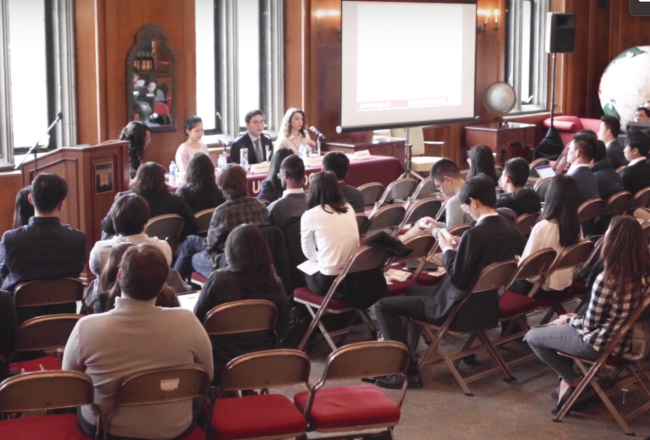You have /5 articles left.
Sign up for a free account or log in.

A UChicagoGRAD session
University of Chicago
The University of Chicago on Tuesday announced a series of reforms aimed at getting students through their graduate programs faster and with better training for whatever careers they pursue.
In so doing, Chicago is the latest institution to address excessive timelines, completion problems and poor faculty job markets for many Ph.D. students.
Chicago’s biggest change, which applies to doctoral students in the humanities, social sciences, divinity studies and social service administration, is financial. Whereas doctoral students are currently funded for up to six years, depending on their programs, the new framework promises all students in good academic standing who enrolled in summer 2016 or later full funding until they graduate, with no limits.
Provost Daniel Diermeier said in an interview that this particular reform is aimed at reducing how long students take to get their Ph.D., or time to degree -- and whether they get it at all. Programs in the four divisions affected have varying average times to degree, he said, and Chicago “isn’t so much worried about the average as the tail.” The phenomenon of students studying for eight or nine years and then dropping out before they get their Ph.D. “has to stop,” he said.
Indeed, national advocates for Ph.D. reform have called this kind of late-stage attrition an institutional failure.
Students who enrolled earlier than mid-2016 may be eligible for additional funding, as well, such as through dissertation completion fellowships.
Chicago’s guaranteed annual stipend level as of now is $31,000. The new funding model begins next fall and will take two years to fully adopt. Once it is in place, all students will have paid health insurance premiums and full tuition coverage, in addition to the guaranteed stipend.
If full funding is the carrot to finish one’s degree in a timely manner, minimizing financial distractions, there is a stick -- at least for departments. Currently, program cohort sizes aren’t strictly linked to completion. But they will be going forward. Now, the total number of Ph.D. students in the four divisions affected will be a fixed, yet-to-be-determined number -- and new students will not be admitted until current students graduate or leave.
There is room for variation across fields in terms of time to degree: Diermeier said that anthropology, for instance, will differ from economics. But departments will have to weigh entering cohort size against maximal time to degree to meet annual target sizes at the division level.
The new model was informed in part by a recent report from Chicago’s universitywide committee on graduate education, which said that Chicago’s current funding model was helpful but did not reduce time to degree or late attrition. It suggested “fix[ing] the overall size of a program’s graduate population.”
Capping graduate enrollments has been suggested in conversations elsewhere about academe’s supply-demand problem with respect to Ph.D.s looking for faculty jobs. But the idea remains controversial, with opponents citing a need to create more good, nonadjunct faculty jobs instead.
Asked about internal debate on this point, Diermeier said he expected it and welcomed meaningful conversations. Departments need to take “full ownership” of these issues, Diermeier said. And the cap is an “incentive” for them to offer struggling students early interventions and more effectively mentor all students.
The last part of the new model detaches teaching assistantships from funding. In his announcement to the university Tuesday, Diermeier said that doctoral education should not only prepare students “to engage in original research of significance but also help them learn how to teach and communicate the approaches, theories, results and methods of their field.” So faculty members in each program going forward will determine the type and number of mentored teaching experiences their students need, “with tailored pedagogical training plans and active faculty engagement.” Whatever that looks like, stipends will not vary.
For all students, not just those in the humanities, social sciences, divinity and social service administration, Chicago also announced UChicago Launch. Part of the greater UChicagoGRAD program for placement and career diversity, Launch will provide resources for students finishing their programs and recent graduates who want to work outside academe. Offerings will include one-on-one advising, funded internship placements and workshops on different sectors and the job hunt.
Diermeier’s office, working with deans and departments, also plans on developing programs and resources for building faculty mentorship skills. The university also plans on expanding an existing teaching fellows program so that more Ph.D. graduates may teach, do research and prepare for job market. And UChicagoGRAD is launching more programs to help recruit and maintain the best and brightest students from all backgrounds, such as pilot programs to reduce out-of-pocket costs associated with visiting and moving to campus. The program will hire current graduate students to create customized departmental outreach and communications plans. In the spring, it will start accepting proposals for a new innovation fund to encourage the development of new recruitment and yield initiatives.
"Much work has gone into developing this framework, and much work remains to be done,” Diermeier wrote in his campus message about all the changes. “While the model specifies overarching guidelines, departments and schools will determine how to most effectively implement the model within their particular programs.”
Clifford Ando, David B. and Clara E. Stern Professor, Departments of Classics and History and a member of the graduate education committee, said that the new funding model takes up many of his and his colleagues’ recommendations. Even where it doesn’t, he said, it still addresses “concerns and problems identified by the committee nearly across the board.”
Specifically, Ando said the plan does at least two things that will be “transformative” for graduate education. First, it “completely removes the cliff that students faced when their old-fashioned guaranteed package ran out. No longer will later students face sudden insecurities and unpredictability of work, income and insurance.” And by capping cohorts for a program as a whole, rather than thinking of year-to-year admissions, he said, the plan seeks to inspire all members of “the community, students and faculty, to exercise shared responsibility and oversight for the program,” not least in the “crucial areas of time to degree and attrition.”
Graduate Students United, the university’s unrecognized American Federation of Teachers and American Association of University Professors-affiliated graduate student union, said in a statement that the plan is “not just a change to our funding structure, but a sweeping overhaul of the entire graduate program” in humanities, divinity, social sciences and social service administration.
While the new policy increases the amount of guaranteed funding for certain cohorts, the union said, “it also caps total enrollment in individual programs and redefines graduate lectureships and TA-ships as ‘mentored teaching experiences,’” as opposed to work.
The changes are therefore a “blatant attempt at union-busting by the university,” Graduate Students United continued, “dressed up as a pay increase for a limited number of grads.” The only real way to secure “fair pay and fair treatment for all grad workers on campus is through collectively bargaining for a contract.”
Chicago, like many private institutions, maintains that graduate assistants are students and not workers, despite a 2016 National Labor Board Decision saying otherwise. The current board seeks to make a rule against that precedent, however.
Diermeier said earlier this year that graduate student unionization would “fundamentally alter the decentralized, faculty-led approach to graduate education that has long been a hallmark" of Chicago. Ongoing improvements to graduate programs “may have to stop if the university were to recognize a union."









